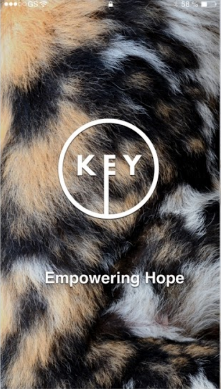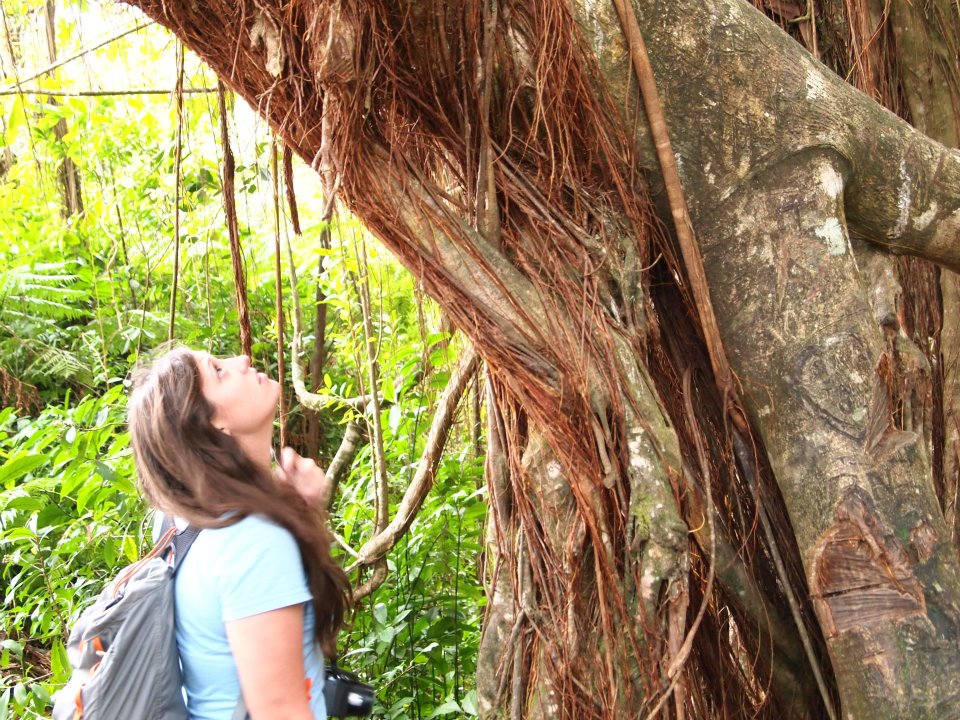It was during a summer working as a park ranger in Yellowstone National Park that Megan Cromp found herself wanting to do more to help connect visitors to the park. When she heard about the important work that Teton Science Schools was doing to connect people from all walks of life to nature in the Greater Yellowstone Ecosystem (GYE), she jumped at the opportunity to join the team. During her first summer at TSS, she worked as a program assistant on the Field Education team, connecting local children with educational opportunities in the parks. Then, after a year away at Graduate School in the UK, she returned to work with Wildlife Expeditions, planning weeklong adventures through Grand Teton and Yellowstone National Parks. For Megan, working at TSS was a great way to see first hand how one week in a place can change a person’s outlook on nature forever.
Today, Megan is continuing her passion for connecting people to nature through her own organization, Key Conservation. We had a chance to talk to Megan about how her connection to place inspires her work and why empowering hope around the world is her ultimate dream.
 TSS: How has your connection to place inspired the work you currently do?
TSS: How has your connection to place inspired the work you currently do?
Megan: My time living in the Greater Yellowstone Ecosystem and working on different field sites around the world changed the way I see certain moments in my life forever. I have felt the importance of place from hearing the calls of the then extinct in the wild Hawaiian crow as I walked down a jungle path, seeing a sea turtle hatchling sprint to the sea, to watching wolf packs run through the hills of Lamar Valley in Yellowstone National Park at dawn. These moments change you and when I look back and imagine a world without these calls or sights it makes you want to stand up and fight to ensure they will be there to change the souls of generations to come. Key Conservation taps into those moments that each of us has experienced somewhere along in our lives and gives people actionable steps to help protect them.
TSS: What does place mean to you?
Megan: Place, to me, means tapping into the unique features, environments or businesses of an area to take a learning experience to the next level.
TSS: Tell us more about Key Conservation.
Megan: Key Conservation is helping conservationists receive critical funding and increased global support through a mobile app that provides real-time updates on day-to-day campaigns.
The Key Conservation mobile app will have a scrolling feed that will update as needs from conservationists occur globally. This new flow of real-time data allows for innovative approaches for assistance from supporters and mentors. The Key Conservation app provides three ways for conservation organizations to get help and three ways for supporters to give it.

The first way is through the feature called Skilled Impact which enables supporters to give their professional skills to help conservation projects. For example, a graphic designer could help with an outreach campaign or drone operator could help with collecting data on a remote study area. Tapping into these skills could save conservation organizations thousands of dollars while creating a lifelong connection with a supporter. The second feature allows supporters to give funds to a conservation project to help with issues happening in real-time or long-term goals. Lastly, the In-Person feature allows supporters to be alerted to real-time volunteer opportunities in their area through geo-based push notifications. This feature updates automatically as people travel around the world, alerting them to the work being done within a customized range. For example, if a conservation organization needs help pushing their patrol vehicle out of the mud or they want to alert locals of a sea turtle hatchling release they can send out a push notification to supporters within a set radius.
After the contribution has been put to use the conservation organization will send a photo/video update to the supporter to show the outcome. Creating a transparent, stronger and more intimate connection that supporters have been wanting.
TSS: Where did the inspiration for Key Conservation come from?
Megan: The inspiration for Key Conservation came from my varied experiences working in the conservation field. I saw a lot of the same recurring themes of the lack of funding, global awareness, community involvement or access to skilled help. These conservation organizations are working night and day to not only save their species but to keep their day to day operations afloat. If an unplanned event occurs like a hurricane tearing through a field site or a patrol vehicle breaking down most of these organizations wouldn’t have the resources to survive. On the other hand I personally knew so many people who were eager to do more and be more involved in conservation but they just didn’t know how. Someone who loves sea turtles might not even know about the small conservation organization that is in the field working to save their favorite species and we needed a better way to connect them. Pretty much Key Conservation grew out of my own frustration with this disconnect and I decided to do something about it.
TSS: What was the moment you decided for yourself that Key Conservation needed to happen?
Megan: I have this rule that if you keep complaining about something then you better be a part of the solution. Well the moment finally came when I decided that I was tired of complaining about my fellow conservationists struggling to save species while also listening to my other friends saying they wanted to do more to help conservation efforts besides a monthly donation. They wanted to get in there and use their skills, their time and see what they were helping to accomplish. I knew we needed the world’s help if we were going to save the many species threatened with extinction so I started chipping away at the idea, asking what if and the ball started rolling.
 TSS: What has been your most rewarding moment since launching Key Conservation?
TSS: What has been your most rewarding moment since launching Key Conservation?
Megan: Hands down the most rewarding moments I’ve had since launching Key are the opportunities I’ve had to speak with the conservation organizations that we are working to help. I am lucky in that I have the privilege of learning about the critical work they are doing and also hear about their pain points. They inspire me to create something of value that will hopefully help them streamline their work and reach a global audience.
TSS: What has been the most challenging part of launching a conservation non-profit?
Megan: The most challenging part of launching a conservation non-profit for me personally has been not being in the field. My heart is with endangered species reintroduction work and I would love nothing more than to be doing that right now but my hope is that we will build a platform to help many more organizations with reintroductions and research in the future.

TSS: Why is place-based education important in the world today, particularly when it comes to conservation?
Megan: They say that you can’t love what you don’t know. Having people take a step outside of their daily routine and experience place-based education brings a completely new perspective that really drives home the issues conservation is facing. Ask anyone who has spent time working within the environment or directly with a conservation organization and they will tell you how connected they feel. Our hope is that by providing real-time volunteer opportunities through the Key Conservation app we will inspire more people to get involved in their local conservation organizations.
TSS: What are your biggest dreams for the impact Key Conservation will have on the world?
Megan: I want to empower hope around the world. I want the conservationist who feels alone in the field while trying to save a critically endangered species or the person at home who doesn’t even know where to even begin to help the environment to have actionable steps to make a real difference. I believe that we can build a community whose individual actions can compound into significant change globally.
You can learn more about Megan’s work and Key Conservation at www.keyconservation.org.


